Big Fishing
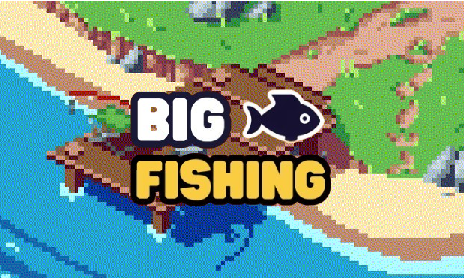
Big Fishing is a chance-based RNG game, blending fun with an important message-to create awareness about marine pollution and sustainable fishing.
This is a fishing game where the user fishes with a fishing rod which triggers the random number generator to determine the users catch.
Big Fishing is an fun and effective game that raises awareness about unsustainable fishing, marine pollution, and life below the water. It raises awareness about unsustainable fishing because the fisher only uses fishing rods, which is sustainable because it does not really affect marine life population since it only catches one fish at a time. It raises awareness of marine pollution since you can come across junk. It teaches about fishes from the real world and also make players know that the fish is rare or close to extinction.
Results vary from common fish, such as brown trout, to uncommon fish like tuna, rare fish like salmon, and even sharks. The rarest fish in the game is a devils hole pupperfish, which has a very low chance of being obtained. All the fish are based on real world fish. You can also come across catching junk, which focuses on marine pollution. A logbook system shares facts about the fish that the player has caught, such as where it lives, how rare it is, what kind of minerals or vitamins you can get from eating the fish and many more. There is an ai helper to give further information about the fish in the logbook system.
Guardians of the ocean
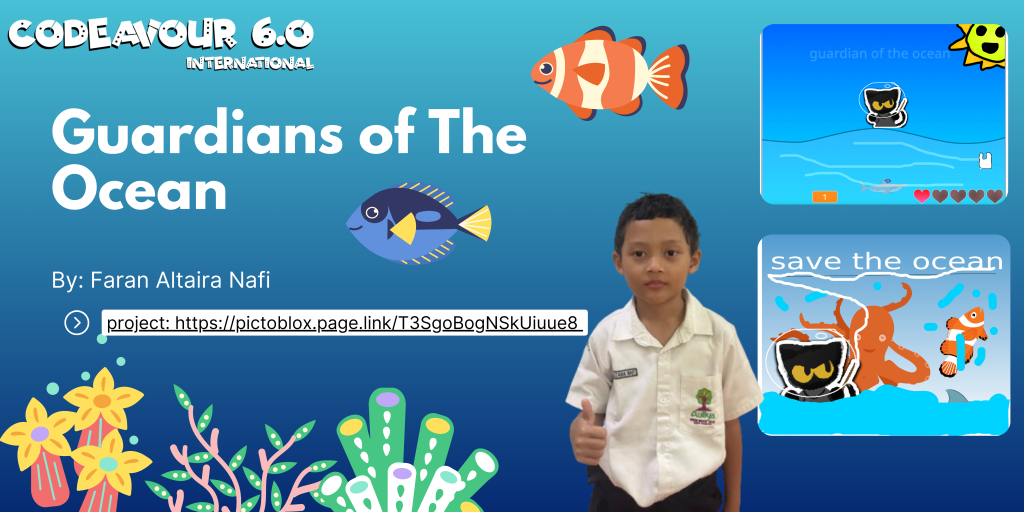
Guardians of the ocean is a fun and educational game designed to raise awareness about ocean pollution. In this game, players take on the role of cat guardians who catch trash thrown into the ocean by humans. The goal is to clean the ocean and protect sea animals.
Marine Protector: Clean, Rescue, and Quiz Your Way to Victory
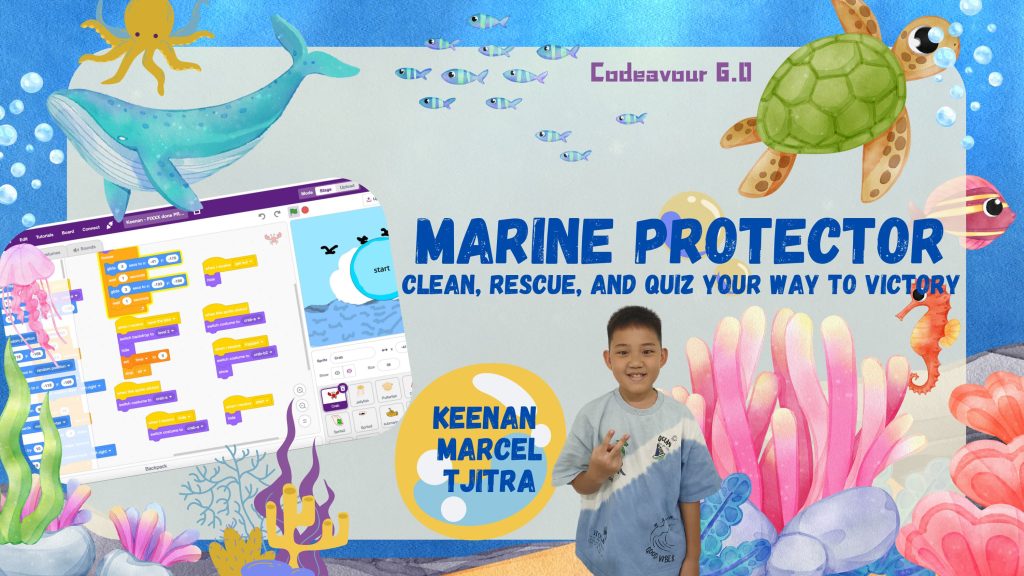
Life Under Water – A Codeavour Game Project:
For the Codeavour competition, I developed an interactive and educational game in PictoBlox using block coding, theme”Life Under Water”. This game aims to raise awareness about marine conservation through three engaging levels, each designed to challenge players while teaching them the importance of protecting ocean life. In “Level 1”, players must clean up all the trash in the ocean within a given time. However, they must be careful not to touch any sea creatures. Failing to collect all the trash or accidentally hitting a marine animal will result in losing the game, preventing the player from advancing to the next level. In “Level 2”, players take on the role of an ocean rescuer, freeing trapped marine creatures caught in fishing nets. Using precise movements, they must cut the nets to release the creatures safely. Finally, “Level 3” presents a quiz-based challenge. Players must answer questions related to the project, ocean conservation, and ways to protect marine life. Correct answers allow them to win the game, while incorrect responses send them back to the first level, encouraging them to learn and try again. This project not only provides an enjoyable gaming experience but also spreads awareness about the importance of maintaining a clean and safe underwater environment.
PlantLab
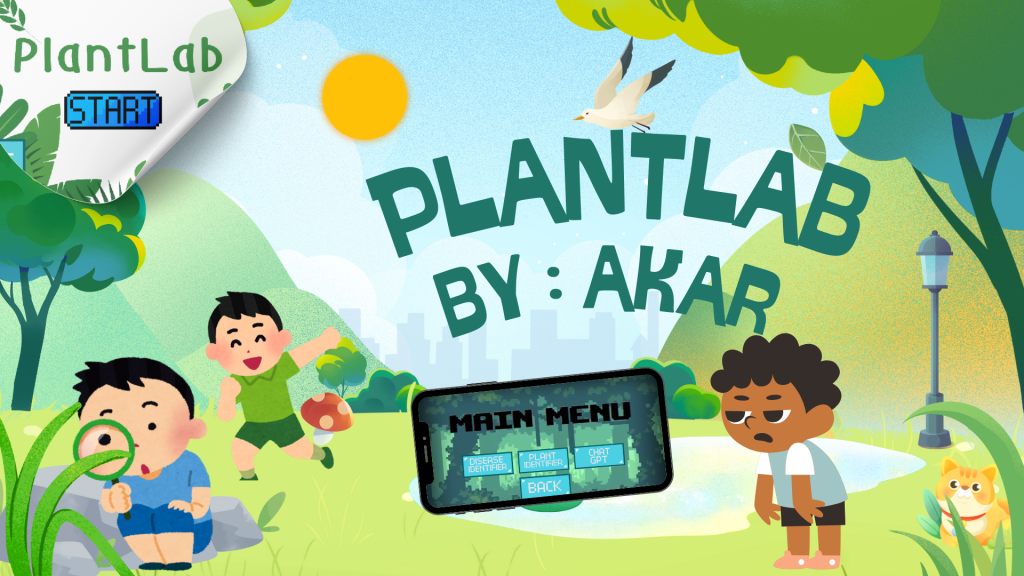
Plantlab is an innovative mobile application that harnesses the power of artificial intelligence to revolutionize the way we care for plants. This app is designed to address the growing problem of plant death globally, which has significant implications for ecosystems, food security, and human well-being.
Key Features:
• Accurate Disease Identification: Plantlab uses advanced AI technology to analyze images of plants captured by users through their phone cameras. Within seconds, the app can identify a wide range of plant diseases with high accuracy.
• Rapid and Reliable Diagnosis: Plantlab provides quick and dependable disease diagnoses, eliminating the need for time-consuming manual inspections or expert consultations. This allows users to promptly take necessary actions to save their plants.
• User-Friendly Interface: Plantlab is designed with an intuitive and easy-to-use interface, making it accessible to anyone, regardless of their technical expertise. The app ensures a smooth and efficient expe for all users
Benefits:
• Reduced Crop Loss: By enabling early disease detection and intervention, Plantlab aims to minimize crop losses and improve agricultural productivity.
• Enhanced Food Security: Contributing to increased crop yields and overall plant health, Plantlab can play a vital role in strengthening global food security.
• Empowered Plant Owners: Plantlab empowers individuals, from hobbyists to professional farmers, with the knowledge and tools needed to effectively care for their pl
collecting trash
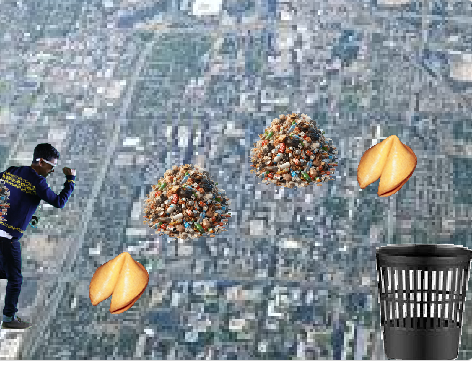
My Project Theme is Life On Land, as a responsible human we need to keep our environment clean. So i create this game for elevate our awareness to put our trashes in the trash bin.
This game is have a human character that his job is to collect all the trashes, the movements are using the hand gesture. the palm fingers facing left is to move left, the palm fingers facing right is for move right. and the palm fingers facing down is for move up, the palm fingers facing up is for move down.
The character need to collect all the trashes into the garbage bin.
Also have a fortune cookie that speed up the movement speed.
Interactive Animal Learning
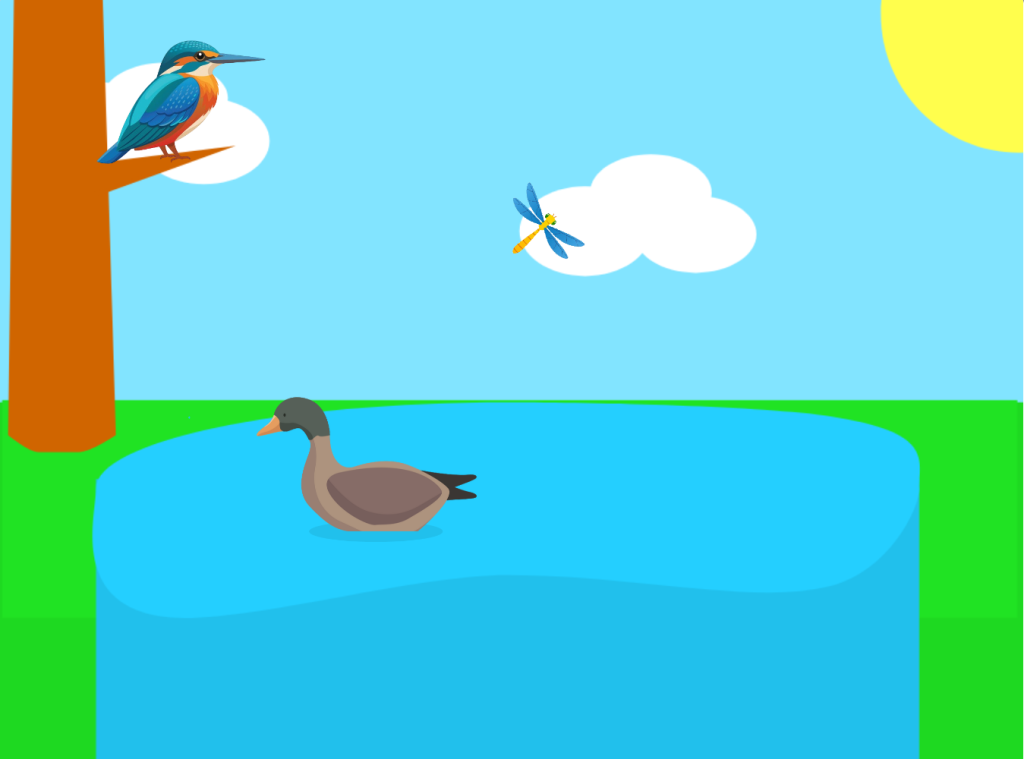
A fun Learning program that helps students learn about animals, by just clicking the animal it could easily show the information about the animal, with the addition of animation, movements, sounds, and design, it makes learning more fun than every other lesson does! With this program we could maybe make a bigger, different animals, style, and habitats, with simply need creativity and less laziness! but for this prototype, it will only have 4 animals and a small habitat (lake), if this project successfully qualify, it will maybe be better at the future.
Clean The Ocean
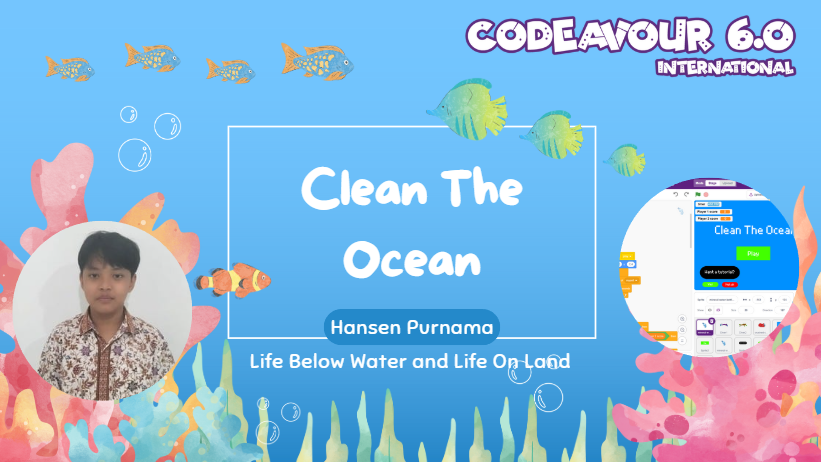
Clean the Ocean is an exciting, competitive multiplayer game that focuses on raising awareness about ocean pollution and its impact on marine life and ecosystems. In this game, two players compete against each other to collect the most trash from the ocean. They navigate through polluted waters, collecting floating debris such as plastic bottles, fishing nets, and other types of waste, while avoiding obstacles like dangerous sea creatures and stormy conditions. The first player to collect the most trash within the time limit wins the game. The game features a unique blend of both underwater and land environments, illustrating how pollution affects both realms. By showcasing the damage caused by waste in the ocean, Clean the Ocean highlights the importance of keeping our waters clean and the need for environmental action. The playful, competitive aspect of the game encourages players to think about conservation while having fun. This game is designed to be accessible for players of all ages, providing an entertaining yet educational experience that encourages a sense of responsibility toward the planet. It aims to inspire players to take action in real life, promoting cleaner oceans and environmental awareness through engaging gameplay. Clean the Ocean offers a fresh and fun way to educate people about ocean pollution while encouraging healthy competition and teamwork, making it a unique addition to games with environmental messages.
Dentrik Panzel
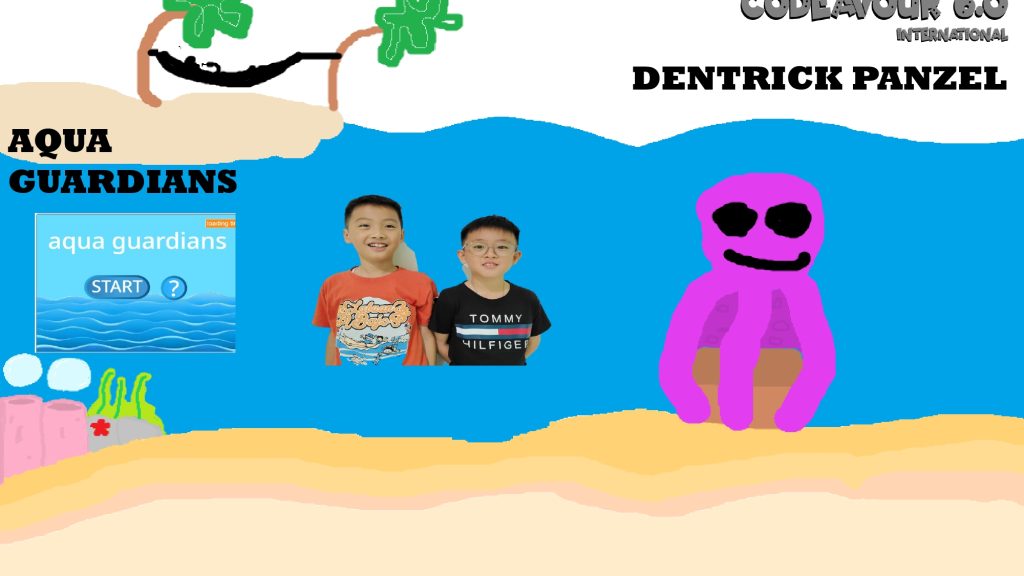
This game was developed in response to the growing concern about the increasing pollution of our oceans, rivers, and lakes. It aims to raise awareness about the environmental crisis caused by waste in our water bodies and encourage players to take positive action to protect marine life. By involving players in the process of cleaning up trash, the game highlights the importance of individual responsibility in tackling this global issue.
Game Concept: The game begins with Tobi, a young character who sets out to grab a bottle of water from the beach. However, when he arrives, he is shocked to find the ocean filled with trash. Determined to make a difference, Tobi decides to take action and clean up the beach. Players must help Tobi by clicking on the various pieces of trash scattered across the sand. Each piece of trash removed brings the beach closer to its pristine state.
Objective: The main goal is to clear all the trash from the beach. Once every item is removed, a message appears: “Congratulations! You have cleaned the ocean!” This provides a sense of accomplishment and reinforces the importance of keeping our water bodies clean.
Theme Inspiration: The game is inspired by the UN’s Sustainable Development Goal “Life Below Water,” which emphasizes the importance of preserving marine ecosystems and keeping our oceans free from pollution. Through this game, we hope to inspire players to take action and contribute to the protection of our planet’s precious water re
Smart Waste Seperator

This innovative project centers around the creation of an automated trash receptacle that not only simplifies waste disposal but also educates the community about the importance of waste segregation. This sophisticated trash can is designed to open automatically based on the category of waste detected by its camera system. The advanced object recognition technology embedded within allows the receptacle to ‘see’ the type of waste being discarded, whether it’s organic, inorganic, or other identifiable waste categories.
The heart of this device is the Arduino, a microcontroller serving as the brain of this smart trash can. The Arduino receives information from the camera via the Pictoblox program, which acts as a bridge between the hardware and software components. Pictoblox, with its user-friendly interface, enables us to program the Arduino to respond appropriately to the type of waste detected.
The camera, acting as the eye of the receptacle, captures images of the waste about to be discarded. This image is then processed by Pictoblox to identify the waste category. Once the type is determined, Pictoblox sends a signal to the Arduino to activate a servo motor connected to the appropriate compartment lid. This servo motor then opens the lid corresponding to the detected waste category.
As an initial prototype, this trash can is constructed using repurposed cardboard, which is then assembled and connected to the Arduino. Despite the use of simple materials, this prototype effectively demonstrates how technology can be integrated to create practical and innovative solutions to everyday waste management challenges.
Save The Ocean
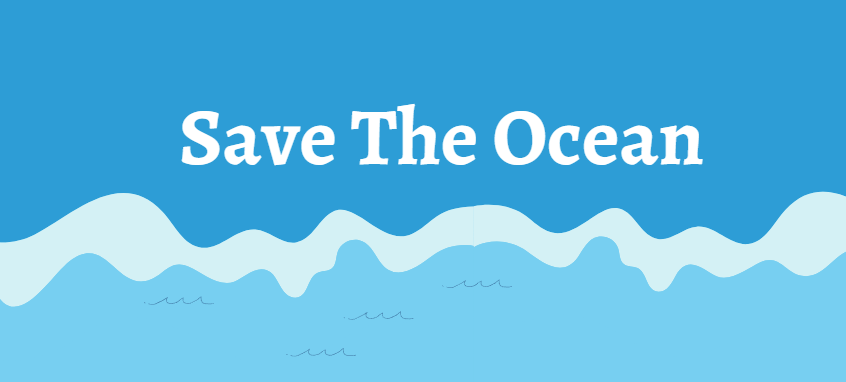
In Save The Ocean, players embark on a fast-paced challenge to pick up as much trash as possible within 30 seconds. This game not only tests speed and reflexes but also promotes environmental awareness by encouraging players to think about waste collection in an engaging and interactive way.
The core mechanics are simple yet addictive: players can fish scattered trash, racing against the clock to collect as many items as they can. Each piece of trash adds to the player’s score.
Save The Ocean carries an important message about keeping the environment clean. Hopefully this game can make the players subconsciously develop a sense of responsibility toward real-world littering issues. This combination of fun and education makes the game both enjoyable and meaningful.
